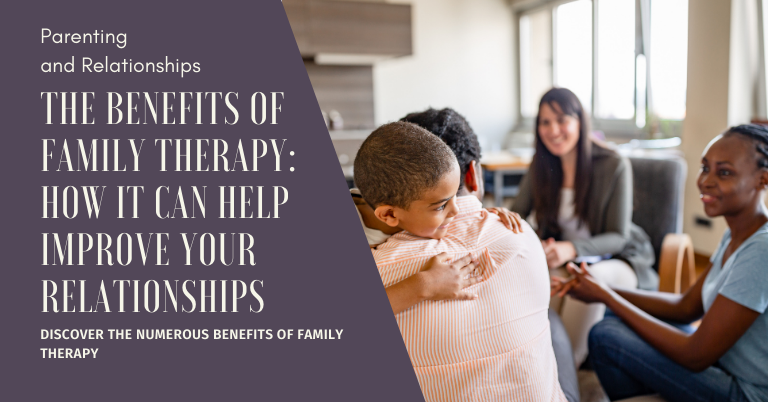Introduction:
Family relationships are the foundation of our lives. They shape our experiences, influence our behaviors, and profoundly impact our overall well-being. However, as much as we cherish these relationships, conflicts and challenges can arise, creating strains within the family unit. This is where family therapy comes in. Family therapy, also known as family counseling, is a highly effective therapeutic approach that aims to improve relationships, enhance communication, and foster healthy connections among family members. In this article, we will explore the benefits of family therapy and how it can transform your family dynamics for the better.

Enhanced Communication:
Effective communication is vital for maintaining healthy relationships. Family therapy provides a safe and supportive space for family members to express themselves openly and honestly. A skilled family therapist facilitates productive conversations, teaching family members valuable communication skills such as active listening, empathy, and conflict resolution. By improving communication patterns, family therapy helps break down barriers, reduces misunderstandings, and promotes understanding and harmony within the family.
Conflict Resolution:
Conflicts are a natural part of any relationship, but when left unresolved, they can lead to long-lasting resentments and emotional distance. Family therapy equips families with tools and strategies to manage conflicts constructively. By creating a neutral environment, the therapist helps family members identify underlying issues, explore different perspectives, and work together towards finding mutually acceptable solutions. Through conflict resolution techniques learned in family therapy, families can develop healthier ways to address disagreements and strengthen their bonds.
Strengthened Bonds:
Family therapy focuses on strengthening the bonds between family members. It helps family members develop a deeper understanding of one another, fostering empathy and compassion. By uncovering shared values, strengths, and goals, family therapy encourages collaboration and cooperation within the family unit. Through the therapeutic process, families learn to appreciate each other's unique qualities, fostering a sense of belonging and connection that is essential for maintaining strong, supportive relationships.
Improved Parenting Skills:
Parenting is an immensely rewarding yet challenging journey. Family therapy can greatly benefit parents by providing them with guidance and support in their role. Therapists help parents understand their children's emotional needs, develop effective discipline strategies, and navigate challenging parenting situations. By enhancing parents' skills and knowledge, family therapy contributes to creating a nurturing and positive family environment that promotes the overall well-being of children.
Addressing Family Transitions:
Families experience various transitions throughout their lives, such as divorce, remarriage, blending families, or the birth of a new child. These transitions can disrupt family dynamics and introduce new challenges. Family therapy offers a space to navigate these transitions successfully. It helps families adapt to changes, manage stress, and maintain healthy relationships amidst these life-altering events. By addressing the unique needs of each family member, family therapy supports the family in finding balance and stability during transitional periods.
Healing Emotional Wounds:
Family therapy provides a healing space for individuals who have experienced past traumas or emotional wounds within the family. Through open and honest conversations, guided by the therapist, family members can address and resolve these deep-rooted issues. By acknowledging past hurts and working towards forgiveness and reconciliation, family therapy offers an opportunity for healing and growth. It allows families to move forward with increased resilience and stronger emotional bonds.

Increased Self-Awareness:
Family therapy not only focuses on the dynamics between family members but also encourages individual self-reflection and self-awareness. Each family member has the opportunity to explore their own thoughts, emotions, and patterns of behavior within the context of the family system. By gaining insight into their own contributions to the family dynamics, individuals can make positive changes and take responsibility for their actions. This increased self-awareness leads to personal growth and helps individuals build healthier relationships not only within the family but also in other areas of their lives.
Building Support Systems:
Family therapy recognizes the importance of support systems outside of the immediate family. Therapists can help families identify and strengthen their support networks, whether it's through extended family, friends, or community resources. By fostering connections with others, families can expand their support systems, which can be particularly beneficial during times of crisis or significant life events. Family therapy encourages families to reach out for help and create a network of support that can contribute to their overall well-being.
Strengthening Coping Skills:
Life is full of challenges, and developing effective coping skills is crucial for navigating them successfully. Family therapy equips families with coping strategies that can be applied in various situations. Whether it's managing stress, dealing with grief, or overcoming conflict, families learn valuable skills that promote resilience and adaptability. By having a toolbox of healthy coping mechanisms, families can face difficulties together, supporting one another through challenging times.
Long-lasting Effects:
One of the significant advantages of family therapy is its long-lasting effects. The skills and strategies learned in therapy continue to benefit families beyond the duration of the therapy sessions. As families implement healthier communication patterns, conflict resolution techniques, and parenting skills, these positive changes become ingrained in their everyday interactions. The transformative power of family therapy can have a lasting impact on family dynamics, promoting healthier relationships for years to come.
Conclusion
Family therapy is a valuable resource for improving relationships and fostering a harmonious family environment. Through enhanced communication, conflict resolution, and strengthened bonds, family therapy helps families overcome challenges and develop healthier ways of interacting with one another. It supports parents in their journey of raising children, addresses family transitions, and provides a space for healing emotional wounds. By increasing self-awareness, building support systems, and strengthening coping skills, family therapy empowers families to navigate life's complexities with resilience and unity. Consider embracing the benefits of family therapy and embark on a transformative journey towards healthier and happier family relationships.

